What are self-awareness skills? How to improve your self-awareness skills (and why self-awareness is important)
I can’t tell you how much time I’ve spent listening to people teach me different skills. From elementary school, to college, to internships, to multiple jobs, my life hasn’t been short of “skills training”–and I know I’m not alone in this. Our culture emphasizes the importance of learning important skills.
And these skills, no matter how varied or specific, are important; especially when placed under the broader context of developing our critical thinking.
Yet throughout all of these educational moments, a crucial skill set often gets overlooked. We rarely teach, learn, or talk about when we need to turn this critical thinking inward.
It’s time to be a student of self-awareness skills.
.
What are self-awareness skills? Three main elements of self-awareness
In a nutshell, self-awareness is our ability to recognize and identify three main elements:
- What we’re feeling
- What we’re thinking
- What we’re doing
If your self-awareness skills are sharp, you can recognize these self-awareness elements at any point. Sounds easy, right? Unfortunately, it’s much more complicated than we think – starting with the fact that we believe our self-awareness skills are stronger than they are. Studies prove that 90% of people believe they are self-aware, but only 10-15% actually are.
Here’s an example. For one experiment, people went about their typical day, and a timer would go off at random times. When they heard the alarm, they checked in with themselves. Did they know what they were doing? Could they name how they were feeling? What led them to this moment?
More often than not, they couldn’t always answer – especially the last question.
It wasn’t necessarily their fault. We’ve got a lot working against us when it comes to being self-aware. Our emotions and biases stem from evolutionary tendencies dating millions of years ago. We’re incredibly reactive to the environment and people around us, often without active decision-making. Throw in some culturally-instilled beliefs and childhood-rooted coping mechanisms, and BAM – you’ve got yourself a healthy mix of obstacles to overcome.
Want to see how self-aware you are? Take my free self-awareness test.
.
Why Self-Awareness Skills are so Important
Now that you know a bit about why self-awareness is so challenging, let’s talk about why it’s so important. Being self-aware allows you to reclaim control over these obstacles getting in your way. You can be more in touch with yourself in everyday life, which builds to you living more intentionally overall.
The list of benefits for having self-awareness skills is endless, but a few highlights include:
- Improved happiness
- Stronger relationships
- Greater success
- Better physical and emotional health
- More purposeful living
This list shouldn’t be surprising. The more self-aware you are, the more purpose you can bring into your life decisions and relationships. You can start to live by your own definitions of self-worth and meaning, rather than getting trapped by what other people say or what we think society wants from us.
But how do you become more self-aware to achieve these life-changing benefits?
.
Learning Like a Student: Self-Awareness Skills for Students
Learning self-awareness skills isn’t all that different from learning any new skill, just like you would if you were a student. The problem is that we don’t view ourselves as students because the “lesson” is, well, ourselves. You’re the teacher and you’re the student, the questions and answers, and the lesson and objective. (Yikes, that hurts my brain thinking about it.)
However, the sooner you can adopt a student-learning-a-new-skill mindset, the sooner you’ll develop your self-awareness. As you read through each skill below, think of it as a new learning objective for yourself. You’ve got to intake the information, practice the skill, and continually develop it in more demanding situations.
I’ve also included some personal examples for each to help explain what each skill can look like.
.
6 Self-Awareness Skills You Need to Find Success
-
Name what you’re doing at any given moment
Sure, most of us can list the big actions that we took in a day. However, things become less precise when we’re asked to identify the moment-to-moment behaviors. Often, our bodies react to things without us even consciously deciding it.
By developing your ability to name what you’re doing, you can learn what prompted the behavior. From there, you can start to use your behaviors as important signals to how you’re feeling overall. You’ll also begin to notice patterns that you never realized before. This information will not only help you better understand what’s happening, but it’ll also help you make wiser decisions moving forward.
Self-awareness skill example: When I tend to feel uncertain or anxious, I seek control in other aspects of my life. Sometimes, I find myself cleaning more obsessively than usual. In the past, I wouldn’t question it. Now I know that if my behaviors become more obsessive, it usually indicates that something else is bothering me.
.
-
Name how you’re feeling at any given moment.
Naming your behaviors comes before naming your emotions for a reason. Our emotions are incredibly complicated and complex. They change, morph, merge, twist, and whatever other verb you want to throw into the list. That’s why recognizing our behaviors can be a good clue into the more elusive target: recognizing our feelings.
Developing this self-awareness skill will take practice. It’ll also take a level of vulnerability, because we’ve got to be honest with ourselves about how we’re feeling. Many of us try to hide our emotions behind dressed-up language or incorrect labels. We’ve got to seek greater clarity when naming our emotions daily. From there, we can begin to work on the underlying emotional patterns and fears that hold us back.
Self-awareness skill example: The number of times I say, “I’m stressed” is astronomical. Yet the word “stress” isn’t even an emotion; instead, it sidesteps the genuine emotions I’m feeling. As I improved this self-awareness skill, I became better at giving more accurate and insightful labels to my feelings. For example, I can trace my stress to a fear of failure and how that might affect me.
.
-
Understand your emotional triggers
Once you can recognize your emotions at the moment, you can begin to recognize your emotional patterns. Many of us get caught in negative cycles. We repeat the same mistakes over and over again, even though they don’t help us. This is because we’re not aware of what is triggering our reactions.
By understanding what triggers certain emotions, you can gain clarity on what you might need. You can also be more proactive with your reactions if you know something affects you strongly.
Self-awareness skill example: I used to get in fights with my husband all of the time because of something he did. I got angry, lashed out, and found myself stewing for days about what was said. Yet, despite all the outbursts, I never really identified what I was actually feeling. Over time, I began to identify my fear of vulnerability that was hidden behind anger. I not only recognized my own, deeper issues, but I also was able to better articulate them to my partner.
.
-
List your strengths and shortcomings in context
Many of us have done some activity that required us to list our strengths and shortcomings. However, developing this self-awareness skill goes a bit deeper. You also want to understand where and how your strengths and weaknesses affect your actions. By understanding the context, you can recognize what you need to do to best utilize your abilities based on your goals and values. You also can be smarter about creating your goals and setting yourself up for success to achieve your goals.
Strengths and weaknesses are not fixed traits (even though we sometimes act like they are). Your abilities will evolve as you do. They’ll also affect you differently in different situations and environments. Therefore, you should always check-in and work on developing this self-awareness skill.
Self-awareness skill example: I’m good at completing tasks and working efficiently. At one point, I would’ve confidently said it was a huge strength in my life. And often it is; it allows me to power through to-do lists and meet deadlines. However, it has also held me back. I neglect to pause and allow space for contemplation, which has hindered my creativity at times. As I develop my self-awareness, I can recognize the nuances of this quality and how it might play out in my life.
.
-
Recognize your impact on your surroundings
While self-awareness is a lot of looking inward, it also requires us to look outward too. If you’ve ever heard of the phrase “intent versus impact,” then you know that what we intend is not always how we impact other people. Being more self-aware means understanding how we affect the people and situations around us.
This external self-awareness is crucial for success in work and relationships. However, it’s not easy to tap into because we can’t always get direct feedback. We’ve got to sharpen our observational skills, look for patterns, and check in with the people around us to develop this self-awareness skill.
Self-awareness skill example: I always thought I was a good listener. I love asking questions, after all, and am genuinely curious about what people have to say. It wasn’t until my friend pointed out that I often interrupt people’s answers – either with another question or an anticipated guess – that I realized this truth. Now, I’m more aware of my impact and try to check in with my behaviors.
.
-
Make decisions with intention and purpose
If you’ve ever sat down to create a pro/con list, then you know what it’s like to put a lot of thought into a decision. We’ve all made very intentional choices in our life. However, we’ve also made choices with minimal intention – millions of them, actually. We’re faced with so many choices in our daily lives that our brain has created biases and shortcuts to help us choose without much effort.
Becoming more self-aware will allow you to check in with both your individual choices and your decision-making patterns. Rather than be ruled by emotions or external factors, you can understand why you made a choice. You can also bring more purpose to your choices because you’ll better understand yourself.
Self-awareness skill example: My need to be the best at what I do often rules my choices. (Don’t worry, I’m working on it in therapy…) While sometimes beneficial, this default way of thinking has led me to do things that didn’t bring me joy. I sometimes got so caught up in “being the best,” I didn’t take the time to ask myself, Is this even what I want? Fortunately, I became more self-aware of my mindset, behaviors, and motivations. From there, I became more intentional about my decisions.
Want to read more self-awareness examples? Check out my post, 7 Examples of Self-Awareness in Everyday Life.
.
How to Improve Your Self-awareness Skills
Don’t pressure yourself to develop these self-awareness skills all at once. Remember, becoming more self-aware is a never-ending process that requires frequent check-ins with yourself and others. Fortunately, all of these self-awareness skills build off each other. Improving one skill will automatically help you with another.
Also, keep in mind that everyone can benefit from developing these self-awareness skills. Whether you’re the CEO of a top-ranked company or a lost college student, you’re going to benefit from these skills. If you fall in any of the categories below, then this is relevant to you.
- Self-awareness skills for leaders
- Self-awareness skills for students
- Self-awareness skills for teachers
- Self-awareness skills for adults
- Self-awareness skills for kids
For more resources on how to improve your self-awareness skills, check out the resources below.
.
Conclusion: 6 Self-Awareness Skills You Need to Find Success in Life
- Name what you’re doing at any given moment
- Name how you’re feeling at any given moment.
- Understand your emotional triggers
- List your strengths and shortcomings in context
- Recognize your impact on your surroundings
- Make decisions with intention and purpose
If you’re looking for your more resources, read more on…
What self-awareness is and if you’re lacking it
- How Self-Aware Are You? Free Self-Awareness Test
- 6 Examples of Self-Awareness in Everyday Life
- Why Self-Awareness Is Important: Recognize What You Can Control
How to be vulnerable and embrace your inner truth
- How to Find Direction in Life If You’re Feeling Lost
- Why Feeling Awkward Might Be Your Superpower
- How to Be True to Yourself: The Hidden Truth We Need to Embrace


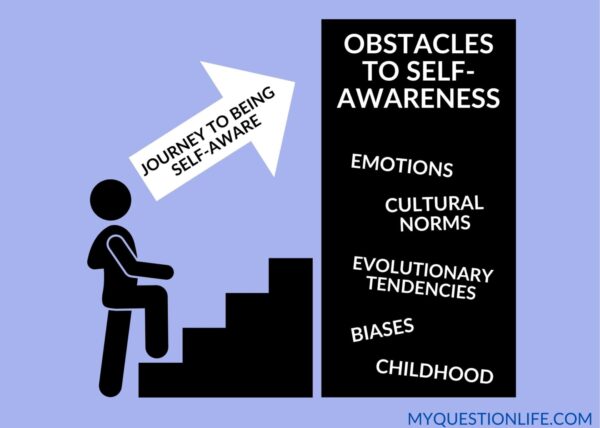
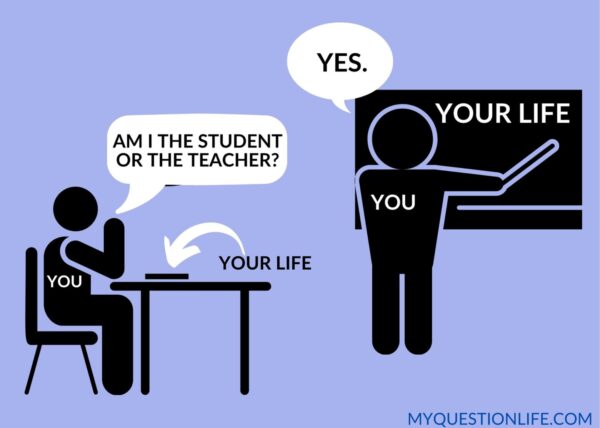
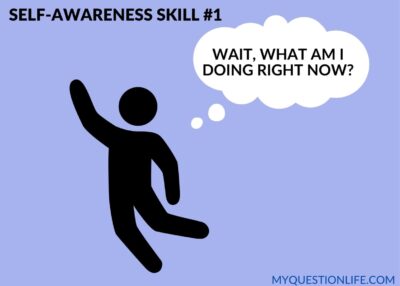
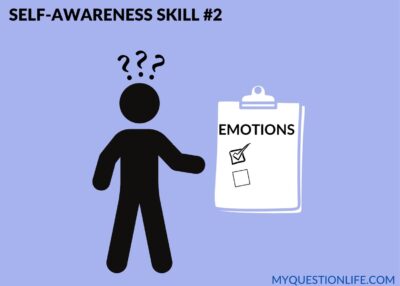
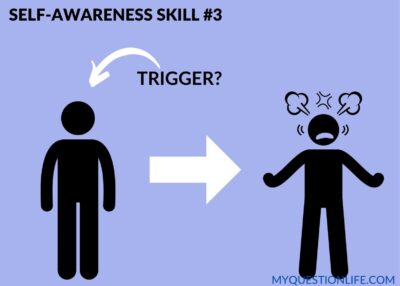
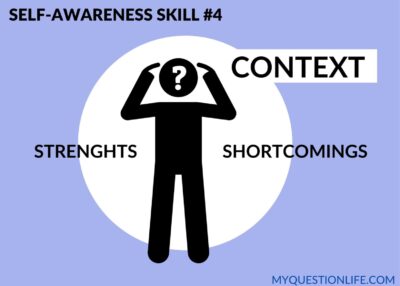
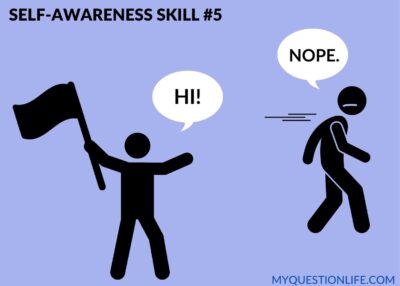
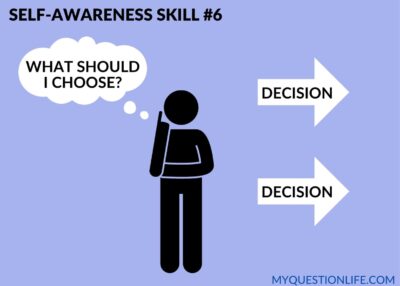
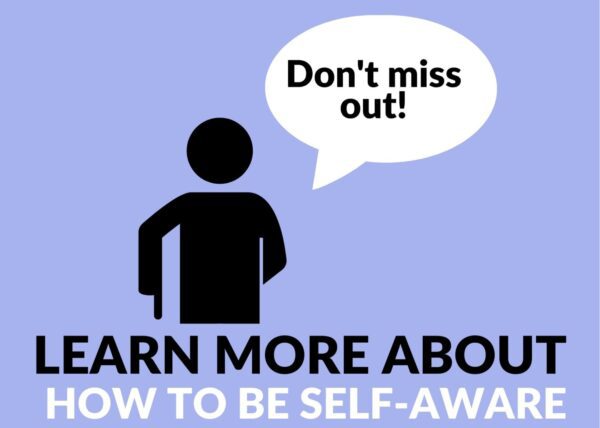


Pingback: 10 Tips for Leaders to Improve Their Self- Awareness - Gibuthy.com
Pingback: Self Awareness - A College and University Development Skill - Grogets.com